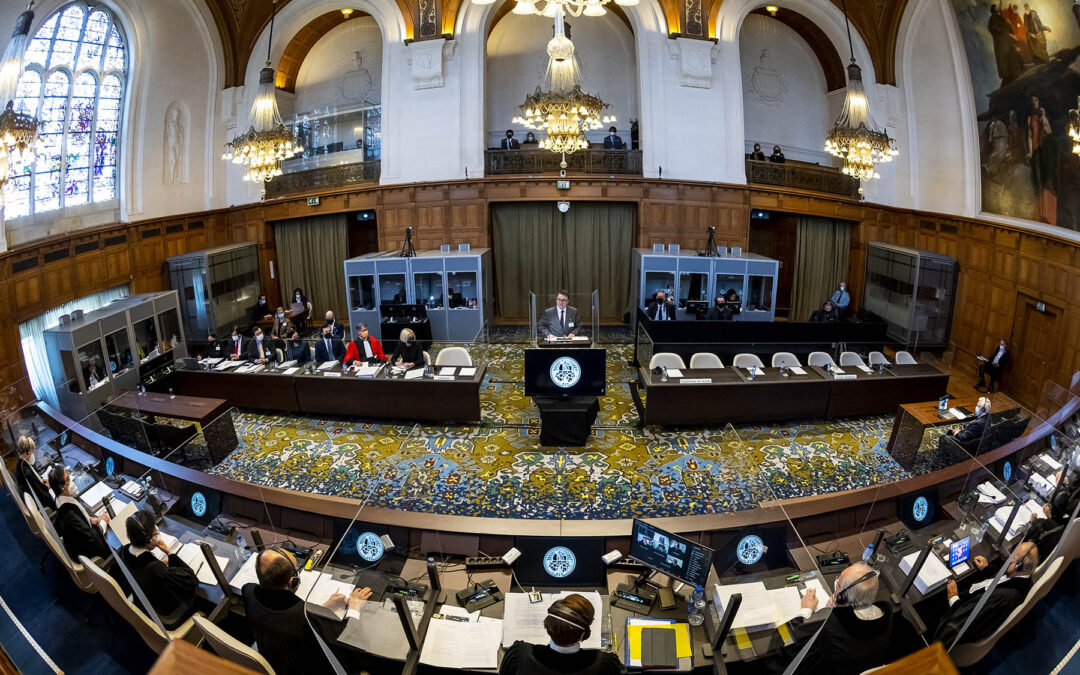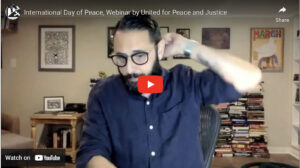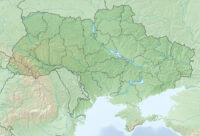Hearing before International Court of Justice, March 7, 2022, with representative of Ukraine addressing the Court. Russia did not attend the hearing, thus the empty seats on the right. Photo courtesy of International Court of Justice.
John Burroughs, Senior Analyst, Lawyers Committee on Nuclear Policy; Board of Directors, Western States Legal Foundation
With the UN Security Council paralyzed by a Russian veto, in two resolutions adopted by the UN General Assembly a large majority of UN member states have strongly condemned the Russian invasion of Ukraine. The International Court of Justice, the UN judicial branch, has also weighed in, ordering the cessation of Russian military operations in Ukraine in a case brought by Ukraine under the Genocide Convention.
Security Council
On February 25, the day after the invasion began, the Security Council voted on a draft resolution condemning the “aggression against Ukraine in violation of Article 2, paragraph 4 of the United Nations Charter” and deciding that Russia shall immediately withdraw its forces from Ukraine. The resolution was not adopted due to a veto by Russia, one of the five permanent members of the Council. Eleven states voted yes (Albania, Brazil, Britain, France, Gabon, Ghana, Ireland, Kenya, Mexico, Norway, United States), and three abstained (China, India, United Arab Emirates).
General Assembly
In view of the paralysis of the Security Council due to the veto afforded Russia, the General Assembly then held an emergency special session on the crisis under a “Uniting for Peace” procedure dating back to the 1950s. On March 1, the Assembly adopted a resolution by a vote of 141 to 5 with 31 abstentions. It deplores the Russian aggression in violation of Article 2(4) of the UN Charter, calls for immediate Russian withdrawal from Ukraine, and calls for all parties to strictly observe international humanitarian law (IHL) regulating the conduct of warfare. The five negative votes came from Russia, Eritrea, North Korea, Belarus, and Syria. Abstainers included China, India, Pakistan, Sri Lanka, Vietnam, and a number of countries from Africa, including South Africa.
On March 24, the UN General Assembly adopted a second resolution on Ukraine by a similar vote of 140 to 5 with 38 abstentions. It reiterates the first resolution’s condemnation of Russian aggression; calls for compliance with IHL; and calls for humanitarian assistance, including to refugees. (Download a pdf of the resolution here.) South Africa offered a competing resolution which did not condemn Russian aggression. The General Assembly decided not to take a vote on the South Africa resolution, as explained in this UN news story.
International Court of Justice
On March 16, the International Court of Justice (ICJ) issued a preliminary order (full text; summary) in a case brought by Ukraine claiming that Russia is abusing its rights under the Genocide Convention by waging a war of aggression to prevent an alleged but non-existent genocide. Both Russia and Ukraine are parties to the Genocide Convention, which provides for the Court’s jurisdiction over disputes concerning the interpretation and application of the Convention. Russia did not participate in the hearing on the matter, but did submit, outside of regular procedure, written arguments which the Court took into account. By a vote of 13 to 2, the Court ordered that Russia immediately suspend its military operations in Ukraine. The two negative votes were cast by judges from China and Russia. Decisions of the Court can be enforced by the Security Council, but such action in this case would be prevented by a Russian veto.
Some Observations
Obviously, Russia has not responded to the General Assembly resolutions and ICJ decision by immediately withdrawing its forces from Ukraine. How much the resolutions and decision are nonetheless influencing Russian actions is hard to assess but they may be having more of an effect than is apparent on the surface. Possible restraining effects on China’s actions are important as well.
The role of the Russian veto in paralyzing the Security Council has once again demonstrated what Ireland called the anachronistic nature of the veto and will no doubt stimulate renewed efforts to limit or abolish it or to reform the Council and the UN system more broadly. These are not easy tasks; among other things, the veto and the identification of permanent members of the Council are written into the UN Charter.
As to the General Assembly, while its resolutions were adopted by large majorities, the number of abstentions indicate that for some African and Asian countries there is a reluctance to take a side in a dispute involving major powers, Russia, the United States, and, to a lesser extent, China, which has somewhat reluctantly backed Russia. This could be due to a justified perception of inconsistency in when the United States and its allies are devoted to upholding the UN Charter (for example, the US and UK were not so devoted when they invaded Iraq); actual or potential political or economic ties to Russia or China; or other reasons (for example, some African countries might have followed South Africa’s lead).
Under the Uniting for Peace procedure, the General Assembly could have gone further than it did in the two resolutions, for example by recommending that states join in imposing sanctions on Russia or in providing military assistance to Ukraine. However, there is nothing barring states from taking those steps anyway, and having such recommendations could have jeopardized the wide support for the resolutions or even their adoption.



